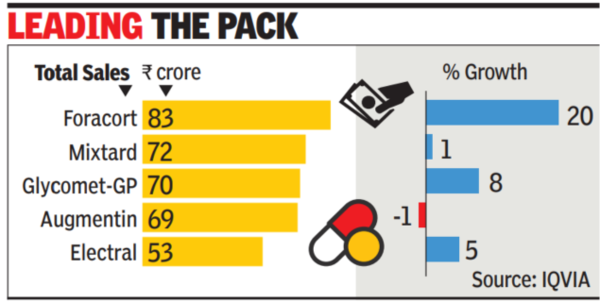Anti-asthma drugs (Foracort and Budecort) continued to post a double-digit growth each during the month, pointing to our struggle with growing pollution levels across the country. Typically, the domestic pharma market has been largely driven by either antibiotics or anti-diabetics in the past.
Jan becomes the third month in which respiratory drugs posted some of the highest increases in recent times, latest data culled by TOI from market research firm IQVIA showed. The pharma retail market had closed the year with a lacklustre 5% growth in December.
Among top rankers, Foracort, used for asthma and respiratory issues, assumed the top slot with a growth of 20% in January, netting Rs 83 crore sales. Other top drugs – anti-diabetes therapies Mixtard and Lantus registered sluggish sales during the month. Overall, the organised pharma retail market, valued over Rs 214,476 crore, grew just over 10% as of MAT (moving annual total) January.

Therapies including Udiliv, Liv 52, Telma and Zerodol-SP registered a strong double-digit growth, while Electral gained 128 ranks to reach 5th position with a growth of 5%. Further, the acute segment, which includes cough and cold medications, showed an upswing of 6%, whereas chronic has grown nearly double to 11%.
Meanwhile, the growth in domestic companies and MNCs was nearly neck-and-neck with 8% and 7% each for January. Growth for most domestic companies is being driven by sales in emerging markets including India, and the US business. The US has always been a lucrative market, accounting for a significant share of their revenues.
Also, certain companies, including MNCs, are facing headwinds by regulatory price controls, undertaken as part of inclusion of their drugs in National List of Essential Medicines. Analysts expect revenue growth of companies to be around 7-9% in FY2024, supported by price increases and new product launches. During a major part of 2023, companies were negatively impacted by the price caps, besides an uneven monsoon, which affected acute therapy sales.